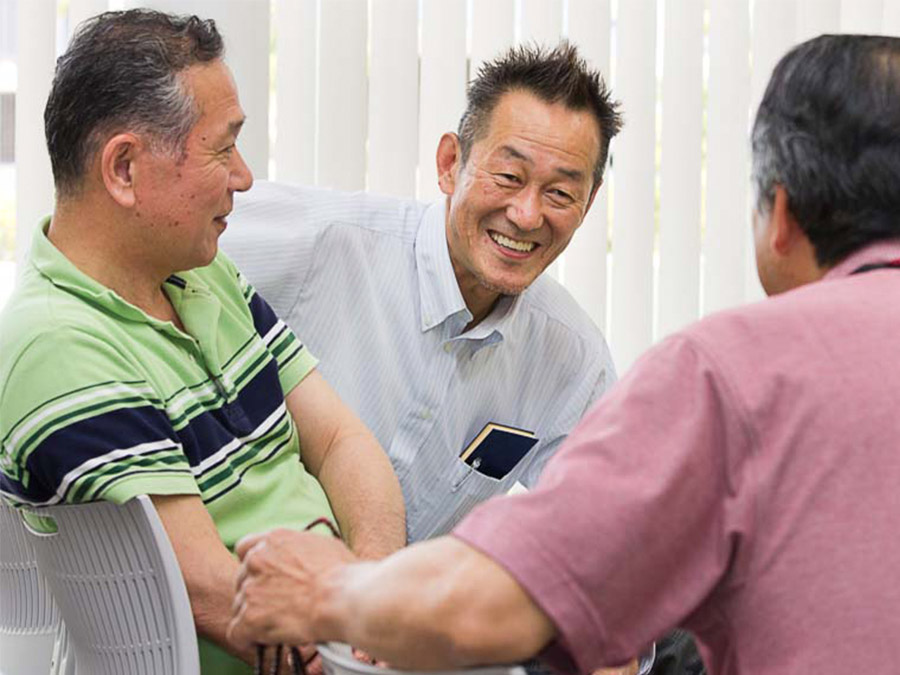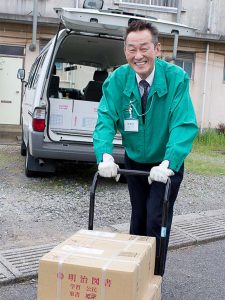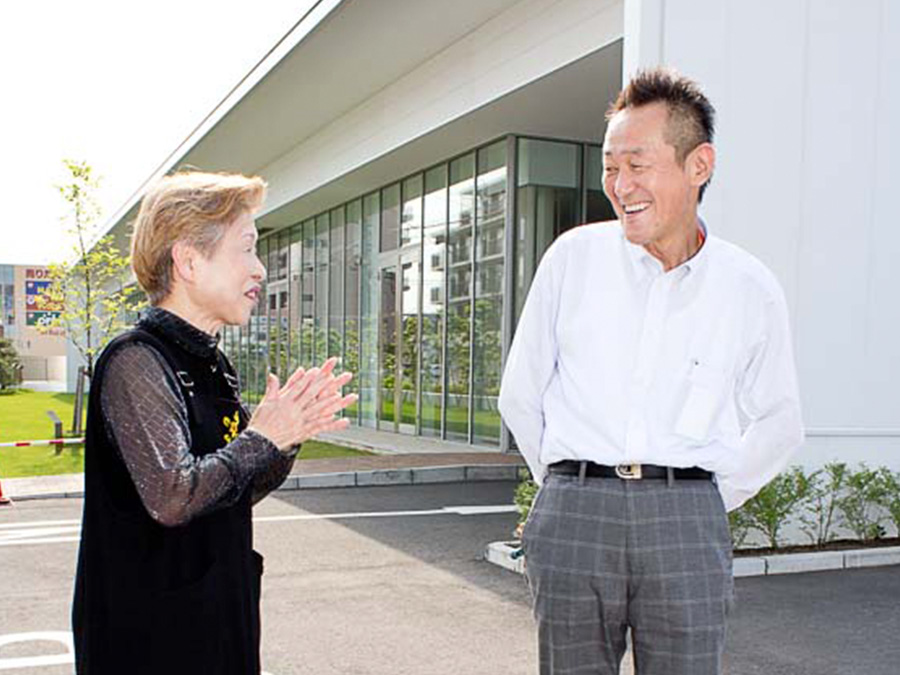Mr. Matsumoto feels peaceful as he happily plays with his dog. His wife, Misako joins him.
Frustrated Ambition
After work, Mr. Koichi Matsumoto jumped onto the train bound for Chiba at Japan Railway’s Shinjuku Station, and let out an exhausted sigh. He saw his tired face reflected in the train window, superimposed over the scene of Shinjuku, as the glittering downtown neon gradually receded from view. Gazing blankly at the scene, he had the realization that his ambition may also fade into emptiness, just like the scene in the train window.
In the summer of 1997, he worked as a debt collector for loan sharks in Tokyo who claimed “No screening and quickie loans”.
The sharks joined hands with a real estate agent to grant high-interest rate loans to people who wanted to open restaurants at vacant sites. Mr. Matsumoto’s job was to psychologically drive the restaurant owner into a corner by demanding repayment of the loan before the restaurant project could get on track. If the owner couldn’t pay up, Mr. Matsumoto would oust the restaurant without mercy. And the system was set up in such a way that the restaurant owner would still have plenty of debt left to pay to the loan sharks.
As a debt collector, Mr. Matsumoto (along with his coworkers) was in charge of four restaurants, but he targeted one café in particular. He thought that café had a bright atmosphere; it would have a capacity of about 30 customers. Mr. Matsumoto used to be a restaurant manager in Shibuya and Shinjuku, both in downtown Tokyo. His intention was to put a stop to that café, and open a new café and pub himself.
Mr. Matsumoto expected that it was just a matter of time before that café would go out of business. A young couple in their thirties managed the café. When they saw Mr. Matsumoto approach them, the wife turned pale and went into the back room of the café; her husband stood there trembling. They had always reacted this way.
During the train ride home, when Mr. Matsumoto would think, “I’ve almost done it!” the figures of the young couple would cross his mind. But this wasn’t because he felt the hisconscience was brothering him.
“Even if I would take over that café from the young couple and become its owner, I might have the same problem . . . .”
Mr. Matsumoto had come to a realization. He simply didn’t have enough money to open a café and pub. If the loan sharks would offer him the loan, there would be no way to refuse it, because he was so closely associated with them.
Mr. Matsumoto thought, “If I worked this out right, I could be able to have my own store again.”
He had been talked into working as a debt collector by an acquaintance about a month ago. He now regretted how thoughtless his decision had been. It wasn’t a profitable job. If he didn’t collect any money, all he received was just transportation fees for the day.
As the train was getting closer to Chiba, where his home was, he had an indescribable feeling. When he arrived home, his then common-law wife, 57 year old Misako, had been waiting for him. She prepared sparkling liquor silently, and she didn’t even ask him about what kind of work he was doing. This made him feel even more depressed. He felt miserable because he wasn’t making much money, and his was the kind of job he wouldn’t talk about in public.
“Now, I should get out of this lifestyle. I can manage a restaurant. Up until this point, I have managed to live by my own wits.”
He raised his face to the train window, and forced himself to smile. But he could only see a man with a tired look and a distorted smile.
After the Economic Bubble Burst
Before he started working as a debt collector, Mr. Matsumoto used to be a manager at several restaurants in nightlife districts. But this wasn’t his first job.
After graduating from a university in Tokyo, he returned to his hometown, Oyama City in Tochigi Prefecture, where he worked as a cooking teacher at the local public junior high school. However, one year later, he went back to Tokyo. He found out that he had passed the teacher’s certificate exam because of a good word from his father, Shuichi, who was an important persona locally. But this wasn’t acceptable to him. Then, without saying anything to his father, he quit his job and went back to Tokyo, just like a child running away from home.
Since he had received his cooking license when he was a university student, he started working in nightlife districts after graduation. He drifted from one restaurant to another while building up a network of connections. He worked as a manager of bars, clubs, and an Italian restaurant. During the period of the bubble economy, he made a lot of profit. When he was managing one bar, operated by a brewing company, he had the highest sales among about a hundred affiliated bars.
But before he realized it, his confidence turned into arrogance. When he went out to drink at a bar, he would complain if the staff was even a little impolite to him as a customer. Further, when he met a customer he didn’t like at another restaurant, he would start quarrels which would often get physical. To survive in the competitive restaurant business, he had learned not to be concerned about what happened to other people’s bars and restaurants.
During that time, Mr. Matsumoto married a woman who had been a regular customer of his bar. They were blessed with two sons, but their marriage didn’t even last ten years. This was due to his cheating. At that time, he was seeing three other women.
Around the time of the divorce, there were signs of his store’s sales declining. Bubble fever had already cooled off. Customers were gradually becoming fewer and fewer.
Afterwards, he stepped down from the nightlife-district business and began working at a supermarket in Chiba City, hoping to eventually make a comeback in his former business. In the workplace, he encountered Misako, who later became his wife. Misako was also once-divorced and had two daughters. The daughters were already independent working adults. Soon after he and Misako got to know each other, they started living together to relieve the loneliness of single life.
However, the supermarket they worked for closed down that year. Then he started working as a debt collector with an introduction from an acquaintance. “If I run a restaurant, and I can get the business on track, I can make Misako’s life easier.” With such sheer desire, he started his new job. But the job was uncertain and risky. Shortly thereafter, he made a clean break with the debt-collecting job.
Around that time, Misako handed a book to Mr. Matsumoto. It was Buddhism for Today, written by Founder Niwano. Misako was a member of Rissho Kosei-kai. Later, he said this:
“When I first held the book in my hand, I couldn’t understand the meaning of difficult passages from the sutra. But I had a strong feeling that I no longer wanted to do the kind of job that makes people cry.”
Since the supermarket was closed down, Misako also lost her job and the couple was in dire financial straits. After he quit being a debt collector, he couldn’t find work. Under these circumstances, Misako used her car to take her neighborhood members to the Dharma center for worship every day; she received a small amount of the gasoline cost from the members, which helped in those tough times. This was because Ms. Yoshiko Sakamoto (who died at the age of 72), then an area leader, had talked about Misako’s circumstances to her area Sangha members. But Mr. Matsumoto and Misako barely managed to get by on that money. Before long, their gas service was cut off because their gas bill was overdue.

Men’s Group members gather, the discussion soon turns to the Dharma.
Looking at the way of life
Soon a turning point came in their life. Mr. Matsumoto started to drink in the evening, and stopped looking for a job. Ms. Sakamoto forcibly took him to the evening Hoza at the Chiba Dharma Center.
During a Hoza session at that time, Mr. Matsumoto let the intoxication take over, talking about how he used to live and his current lack of work. Then Minister Ikuo Furuyama (at that time) said to him:
“Everyone is welcome to come here. Through telling others in Hoza what’s on your mind and listening to others’ words, we place importance on enhancing each other’s spirituality and learning the right way of life.”
“Though I have no job, and am drunk, he is trying to encourage me without blaming me,” Mr. Matsumoto felt the compassion in Rev. Furuyama’s words. And for some reason, he concluded that he should not pursue his dream of working in the nightlife district, but instead should begin to lead a sound and steady life.
Afterwards, Mr. Matsumoto joined a company that sold leaning materials. He drove to junior high schools in Chiba Prefecture and sold information packets and exercise books. Because he had a teaching background, and had developed business management and customer service skills through his work experience in the restaurant industry, the job was suitable for him.
However, after making a steady income for a while, and having had things ease up in his life, he became dissatisfied with his small salary. It was less than a half of the amount he had earned at restaurants.
Each time he talked about his feelings, his wife, Misako gave him friendly advice. “You’ve finally got out of the gutter. Why don’t you just be grateful for your current job?”
With such words, she would often take him to doctrinal seminars at the Dharma center.
However, for Mr. Matsumoto, who had struggled in the fiercely competitive world of the nightlife restaurant business, what was being taught at the seminar was unacceptable. “Why should I put others first?” “Why should I be humble before others?” He couldn’t imagine how people would survive in the real world with such teachings, and he would often argue with the lecturer in the seminar. Still, members told him that it was no problem if he didn’t immediately understand the teachings, and they suggested that he study with them. Mr. Matsumoto felt this reaction was anticlimactic, but he also felt the members’ warm-heartedness, because he had always kept up such a tough front.
At the time, Mr. Matsumoto participated in the festival of Chiba City as a Mando (portable lighted pagoda) player, having been invited by members of the Dharma center. This became an opportunity for him to change his mind. Being a fan of festivals, Mr. Matsumoto was willing to participate in the practice of Mando, and deepened his connection with members of the Men’s Group. Thereafter, he had a chance to play Matoi (firemen’s standard) with members of the Youth Group. Through such activities, Mr. Matsumoto naturally blended in with the Sangha, and gradually devoted himself to the activities of the Dharma center.
Four years prior, Mr. Matsumoto had been selected as a Men’s Group staff member. Mr. Akio Nakane (59), head of the Men’s Group, recommended him. Mr. Nakane had watched over him as he had changed his way of life and was making strenuous efforts to do his job and study the Dharma.

A job selling learning materials was a turning point of his life.
Through an opportunity to serve as a Men’s Group staff member, Mr. Matsumoto aimed at obtaining a certification of the Dharma teacher of Rissho Kosei-kai, and strove to study the Dharma, participate in Hoza, support members in their efforts to convey the Buddha’s teachings, and provide guidance. It was especially through supporting and guiding members that Mr. Matsumoto had a great awakening.
To accept others’ feelings, it was necessary for him to learn from others without imposing his own ideas on them. So he had to be humble before others. And in order for him to become the kind of person who can experience others’ happiness as his own, he found that the spirit of “putting others first” is most important.
Mr. Matsumoto could not help but reflect. “How many persons had I made cry? I had never paid attention to others’ feelings. I never hesitated to use others as a steppingstone to my own survival. I could not find true happiness in such shameful way of life.” Mr. Matsumoto sincerely reflected on his way of life.
However, he still had one big problem in his life to sort out; a reconciliation with his father. Since the time he threw away his teaching job and ran away from home, he had had met his father only a few times. When he failed in his first marriage, he was told by his father not to show his face again. For thirteen years, he had no contact with his father.
Then the remarks of Ms. Mieko Haga (65), head of the Educational Affairs Group, encouraged him.
“Since you were able to renew your way of life, how about telling your father honestly about what’s on your mind.”
Her remarks prompted him to trudge toward his family home with Misako.
After such a long time had passed, he met his mother, Matsu (82). She was completely bent over, and she looked smaller than before. But after looking at him, Matsu could not recognize him immediately as her own son. He looked so different with a mild expression.
After Mr. Matsumoto introduced Misako to her, Matsu held Misako’s hand and said, while shedding tears, “Thank you for turning my son into an honest man.” According to her, seeing newspapers and news reports on TV, Matsu had been worried every day whether her son might get into trouble or be involved in an incident. He was deeply pained by her words.
After that, Mr. Matsumoto was reunited with his father, Shuichi. The moment Mr. Matsumoto opened the door of his father’s room, he felt the strength drain out of him. He knew Shuichi had collapsed from cerebral infarction a year ago and had been bedridden since then. Yet at a glance, Shuichi recognized that his son had returned. He also had been worried about his son.
“What are you doing now?” In reply to the father’s question, while showing his prayer beads he grasped in his hand, Mr. Matsumoto said, “I now lead a sound and honest life.” This was all he could say. Seeing his father bedridden, he remembered with regret the years that he had rebelled against his father and had worried him. But his father quietly nodded, relieved to see his son with such a mild and peaceful expression.
In February, 2012, Shuichi passed away in peace. This time, Mr. Matsumoto rushed in the funeral ceremony and cordially offered sutra recitation beside his dead father with apologies for his past deeds, and appreciation for being liberated by the faith. Seeing his actions, his wife Misakoreaffirmed the preciousness of the Dharma.
In the succeeding years, Mr. Matsumoto has engaged in the activities of the residents’ association, and now as a chief of Child Committee members, he watches out for children in his community. Sometimes he remembers his father, who was formerly a volunteer probation officer.
“I rebelled against my father so much, but now I think I’m doing things as he would do. After all, I am a son of my father.”
Mr. Matsumoto said this shyly, and with a boyish smile.

Ms. Mieko Haga, then head of the Educational Affairs Group, showed him the way of loyalty to his parents.